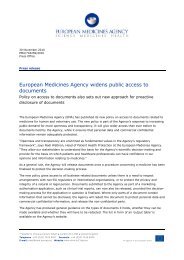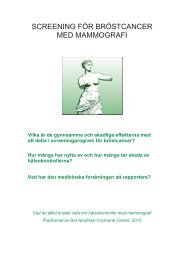1 Selective serotonin reuptake inhibitors (SSRI) â sales, withdrawal ...
1 Selective serotonin reuptake inhibitors (SSRI) â sales, withdrawal ...
1 Selective serotonin reuptake inhibitors (SSRI) â sales, withdrawal ...
You also want an ePaper? Increase the reach of your titles
YUMPU automatically turns print PDFs into web optimized ePapers that Google loves.
Results<br />
We identified 6 documents related to the benzodiazepines and 23 documents for the <strong>SSRI</strong>s (table 2).<br />
All documents are official ones and convey drug regulators’ and other health authorities' positions,<br />
i.e. they express one-way communication and are authoritative. A public and media focus on the<br />
<strong>SSRI</strong> <strong>withdrawal</strong> syndrome initiated a review process, during which working groups were<br />
established in drug agencies that referred to each other in the documents. References are shown in<br />
table 2.<br />
Time to recognise adverse effects<br />
Two papers from the Committee on Safety of Medicines (UK) from 1980 and 1988, an article from<br />
the Committee in 1993, and minutes from the Committee in 2004 (see table 2) showed that it took<br />
more than eight years for the UK regulators to accept the frequency and seriousness of the<br />
dependence potential of benzodiazepines, and ten years to accept <strong>withdrawal</strong> reactions as a class<br />
effect of <strong>SSRI</strong>s and that the symptoms can be serious.<br />
In both cases, the source of the assessments was the spontaneous reporting system for adverse drug<br />
reactions, as shown in a systematic review by the Committee on the Review of Medicines (1980)<br />
and an article by Price et al. (1996).<br />
Increasing frequency and seriousness of dependence and <strong>withdrawal</strong> reactions<br />
The frequency and seriousness of the reactions related to benzodiazepines increased in the<br />
assessments over time. In 1980, the estimate of people suffering from benzodiazepine dependence<br />
was low, only 28 persons in the UK (Committee on the Review of Medicines, 1980), but in 1988,<br />
the risk of dependence was becoming “increasingly worrying” (Medicines Control Agency). From<br />
1980, restricted use of benzodiazepines was recommended from 1980 (Committee on the Review of<br />
Medicines, 1980), i.e. short-term use, doses within the therapeutic range and gradual <strong>withdrawal</strong>.<br />
From the meeting minutes in the UK Medical Research Council, an estimate of the frequency of<br />
dependence appears low, but because many people used benzodiazepines, the number of dependent<br />
people was assessed to be around 10,000 – 100,000 people in UK (Medical Research Council<br />
Headquarters file 1980-82).





